How a grandpa’s backyard invention grew into a family-run, multi-national business
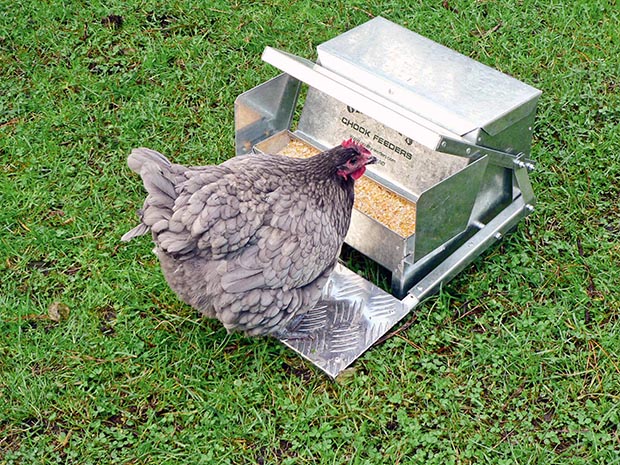
When Bill ‘Grandpa’ Kirkham came up with a good idea for a chicken feeder, he had no idea it would turn into a family-run multi-national business, Grandpa’s Feeders.
Words: Nadene Hall
When you own poultry, something is always trying to steal their feed: rats, mice, wild birds. Trying to stop the thieves and varmints turned from a challenging project for retired farmer Bill Kirkham into a multi-national business for his family, who now sell their automatic chicken feeders around the world. Bill used to be a dairy farmer and he always liked tinkering. One of his daily frustrations was the amount of chicken feed he lost to roaming rodents and cheeky sparrows from the containers in his hen house.
“It was driving him nuts,” says his son Mark, who with wife Alla now runs the business that started in Bill’s workshop.
“Instead of trying to solve the problem, he thought he’d just get rid of the chooks, but a friend gave him a wind-up and joked ‘shame the rats and sparrows are cleverer than you!’
“So he went down to his shed and spent hours trying to figure it out. The first model stopped the sparrows straight away, he finally stopped the rats on the third model, but because it was made of wood, they chewed holes all through it.”
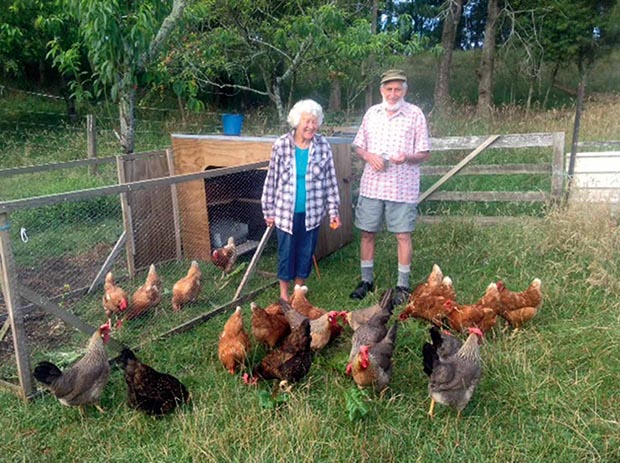
Jean and Bill ‘Grandpa’ Kirkham with their flock.
Bill fixed the feeder with bits of tin but had to keep mending it until he realised he needed to make the whole thing out of sheet metal. Once construction was finished to Bill’s satisfaction, he lent it to the mate who’d given him the wind-up.
Two weeks later, the mate told Bill he wouldn’t be getting his feeder back, and by the way, he wanted two more. The feeder’s popularity slowly spread by word of mouth and Bill made them in his spare time out in his shed, two or three a month, selling them at close to cost.
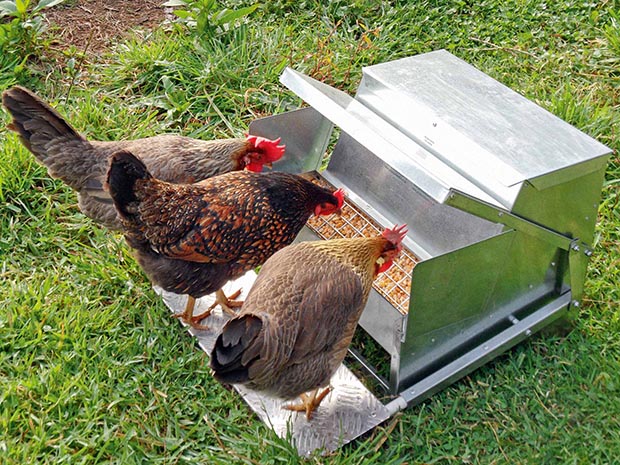
As orders grew, Mark worked with him, but after two years, the novelty of building them by hand had worn off and Bill was ready to give it up. Mark says that’s when he knew they had to make a big decision.
“The biggest factor for me to get involved was people writing to Dad to say how it was the most wonderful thing they’d bought in their life. Dad was showing me these letters and I said to him, ‘Look at what people are writing, you didn’t ask, they’re just telling you how neat the product is’ and it was something we heard all the time.”
Bill’s biggest problem: he wasn’t making any profit.
“He was going to walk away,” says Mark. “I’d been helping him build them and I thought if we priced it properly and got a bit better machinery, it might be worth it.”
Mark decided to go for it, upping the price of the base 18kg feeder model to $180, and introducing a second smaller feeder that held 9kg of food. His father was unconvinced people would pay that much. Their first show was the Mystery Creek (National) Fieldays in 1999.
“I had very little experience of sales myself and I must admit I was freaking out the day before the show. and I sold only eight feeders.
“But I gave away heaps of brochures and in the weeks after we had people ringing up every day and putting in orders. Not surprisingly, the 9kg one turned out to be the most popular because it’s suitable for people with half a dozen chooks and for most people, that’s all they keep.”
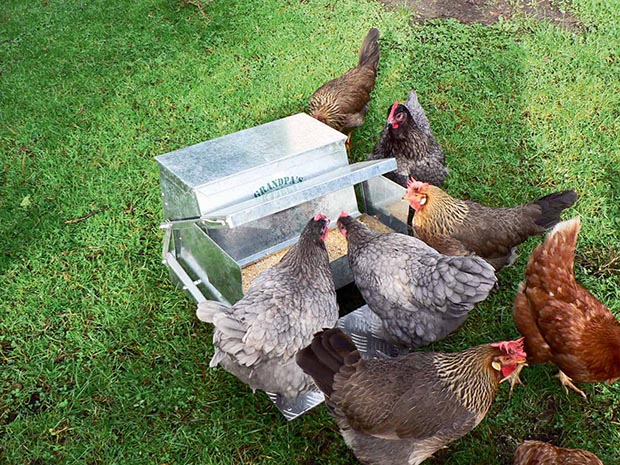
In typical Kiwi fashion, the new venture got help from all sorts of unexpected quarters. A boatbuilding friend in Tauranga let Mark learn new skills in his workshop. An engineer cousin assisted with some design aspects. Other family and friends offered support.
“Those people who helped us get off the ground look back now at where we’ve got to and are pretty surprised and delighted, just like my Dad, he can’t believe it, he finds it astonishing what we’ve done.
“When he was first selling them, they didn’t even have a name (for the feeders). My Dad is known as Grandpa and he’s very much a grandpa sort of person, so that was the right name. It also conjures up pretty nice ideas and thoughts that reflect old-fashioned quality.”
Since its small beginnings, the company has gone from strength to strength. In 2012 Grandpa’s Feeders sold 200 units at the National Fieldays, and it was just one of dozens of events that Mark and Alla attended, including shows in the UK and Australia.
The company may now send its products around the world, but its base is still the family home on neighbouring lifestyle blocks near Tauranga. Bill and his wife Jean have 4ha, next door is grandson Caleb and his wife who live on Mark and Alla’s block and help dispatch the products, and next door to them is Mark’s brother and his family.
When the couple let their house to Caleb and his family to live in, they bought themselves a purpose-built caravan which they live in permanently. They spend up to four months of the year travelling to A&P shows and field days.
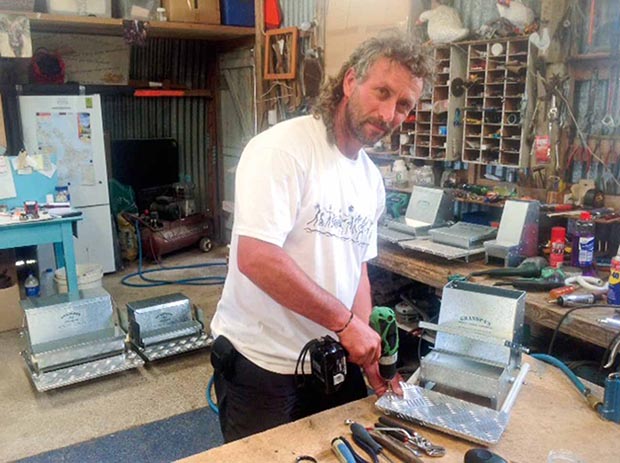
Mark building a feeder in the early days.
“We pretty much do it ourselves,” says Mark. “My business partner lives in Tauranga and he runs the overseas marketing from an office in his house. We run NZ from an office beside our caravan, so it’s all done by us. Alla is a massive part of the business, she does more work than I do running the office and doing the computer stuff, her iPad is always very close at hand and she processes all the orders.”
The couple spends much of their time on the road selling their products in person to poultry keepers in NZ and Australia who all have the same problem: the loss of large amounts of chicken feed to rodents and birds.
“We mainly sell direct,” says Mark. “We do print advertising, we have a website, but there’s always a need to get out and do the shows. A lot of people need to be hands-on and fiddle with it, see how it’s constructed. It’s a very valuable part of our marketing.”
The rapid expansion of the business meant that construction of what had been until then a home-built product was out-sourced in 2007. Orders coming in from all over the world and a lot of competition from similar products meant it was a hard but necessary step in the life of their business.
“That was a huge challenge for me, seeing it was my responsibility (for manufacturing),” says Mark.
“I’d been building them for 10 years so it was a sad reality to have to take it out of New Zealand. But because we didn’t have a patent, we really needed to get them manufactured at the best price we could or we might have been blown out of the water with our own product.”
That meant finding a reliable Chinese manufacturer which would do a good job. Again, it was fellow Bay of Plenty business owners who stepped up to help out.
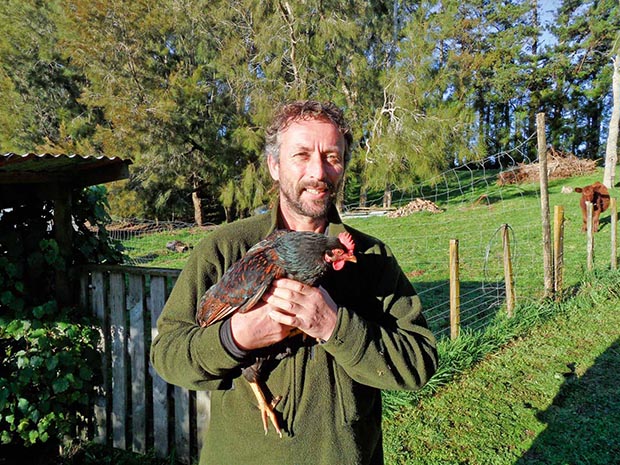
“A friend who was doing furniture manufacturing out of China was massively helpful. For a country boy (like me) to go to China’s industrial area was pretty scary but we weren’t going to back off, we were on a mission, we had a goal. It falls heavily on my shoulders to make sure the product is right, and we had some issues at the start – they were small issues that I could repair – but since then they’ve done a great job for us, after a few hiccups, and we’re still with them. They do a better job than we used to.”
Running a company with clients all over the world was a big change for a man who says he had been a “transient worker and an opportunist”. Mark’s background was mostly in horticulture, managing a sandersonia nursery, growing tamarillos, pruning and managing kiwifruit orchards in the Bay of Plenty. Taking on the role of marketing was a whole new experience.
“I had a belief in the product and I was quite keen to get on and try it, but the first four years were part-time. I was working (full time) and building feeders after work and at the weekends. We got to 2003 and it just became too much work. A decision had to be made, so I chucked in my job.”
Becoming a full-time entrepreneur and marketing man was something Mark says he’s had to work hard at.
“My experience in marketing was absolutely minimal, it only related to naming, patenting and marketing a new variety of tamarillo plants called Gold Bold. I’ve learned by trial and error. I wasn’t a great salesperson to start with, but now I’ve got more experience I really enjoy it.”
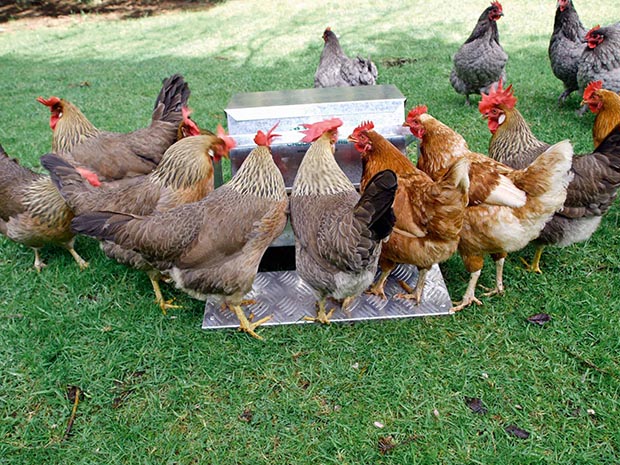
The fun factor is higher still because of the feeder’s humble beginnings.
“When my Dad designed it he just got it right, he was pretty clever and he got a bit lucky, but people liked what they saw, they’d never seen anything like it. A big part of it is that it’s a really neat product – when we go to do shows, so many of our customers come back to tell us it’s a great product, how wonderful it is.” The full-time effort of selling the feeders saw the company grow rapidly, with investments in print advertising and then a website paying dividends.
“To start with it was a long, slow, hard journey, but for us it has been about trying to make our marketing money count.” One of the biggest challenges the company has faced is coping with the influx of ‘copycat’ feeders that don’t work very well, taking advantage of the market the Kirkham’s product has created.
“Whether it was right or wrong, we never patented (the design) at the beginning and then we lost the opportunity. We put all our energy and time into marketing and promoting it and we had it all to ourselves for so long… there are numerous copycat feeders and the worst thing is it’s now causing us a bit of grief. At shows, we have been quite overwhelmed with the amounts of people who have come in complaining about a feeder they’ve bought that’s not worked, that they couldn’t train their chooks to use it, and it wasn’t ours! That’s been a wake-up call and a shock.”
It’s another reason the local A&P shows are such an important part of their marketing. Customers get to see the differences for themselves and know that when they buy a Grandpa’s Feeder, it includes a tried and tested two-week-long training programme for their flock so birds get used to the interactivity of the feeder and its pop-up lid.
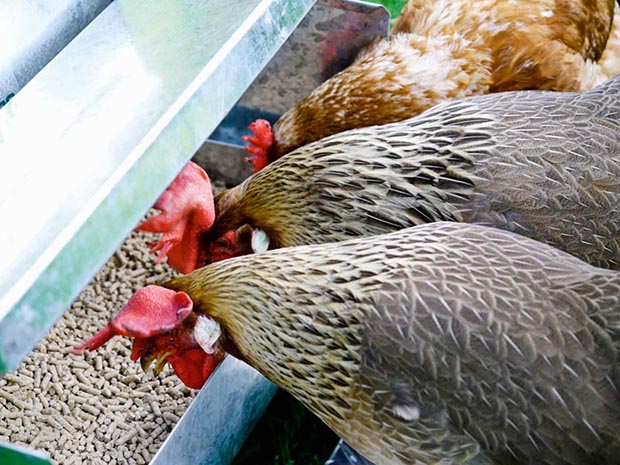
“One of the big things was that people often couldn’t believe their chooks were trainable. Nnice as they are, they’re not the cleverest creatures. Dad had a cunning plan, he went through a lot of trial and error and we’re still using the same (training) systems.
“My wife and I share a fairly extensive chook run with my parents and my Dad still plays a pretty big role in trials and research. We have a neat group of chooks that regularly get photographed and are used for any new trials, and those sorts of things are ongoing, little changes that might improve the product.”
One innovations was a grill to stop hens wasting feed as they peck in the feeder bin for their favourite morsels.
“Some people give their chooks a mixed feed, they might add wheat or maize to pellets… if a hen likes a particular seed, to get to the bit they prefer they flick it with their beaks and chuck it on the ground. The grill stops them doing it, and the idea came from a customer – they showed us what they did and how they solved the problem.
“We certainly pay attention when we’re at shows, listen to the challenges people have had, and that’s been a source of improvements. We’re trying to deal with the competition by being innovative.”
That has meant Bill and Mark spend a lot of time observing their poultry, one of their favourite pastimes.
“It’s about understanding their behaviour and it’s quite a pleasant thing to do, chooks are quite pleasing to watch.”
Running their business has taken on a new direction now they have their caravan and Alla can run her side of the business remotely using a laptop and iPad.
“We are away from home so much… we quite enjoy towing it around the countryside, it’s a pretty big unit, our home away from home. Every time we park up, we’re home again.
“If you have a look at what we’ve done (recently), we’ve got the balance pretty good: we’re carrying a fishing kayak, my wife has her scuba gear for catching crayfish, we went to Kaikoura and went snorkeling for paua, I shot a couple of stags at Nelson Lakes, we caught some trout – I got one, she got seven.
“We’re living the life between each show, making the best of it. We feel lucky that we can create this lifestyle and run our business like this. In this day and age you can run a business from a laptop and an iPad, but if it wasn’t for our son at home looking after dispatch it would be an issue. He and his wife put in long hours while we’re away, and we spend so much time away.”
Despite all their success, Mark says the biggest thrill is still meeting their customers face-to-face.
“It’s really neat to be selling something that people really get a kick out of, when people come up to you and say ‘it’s the greatest thing I’ve ever bought’ while you’re trying to sell one to someone, the (buyers) ask you ‘how much did you pay them to say that?’.
“Our customers vary dramatically, from a young boy with dreadlocks to a little old lady with a walking stick. (Owning poultry) is the biggest growing hobby in the UK, and if you talk to Farmlands and PGG Wrightson, they’ve both told me that chook food is one of their biggest growth products. It’s a clear indication more people are keeping chooks.”
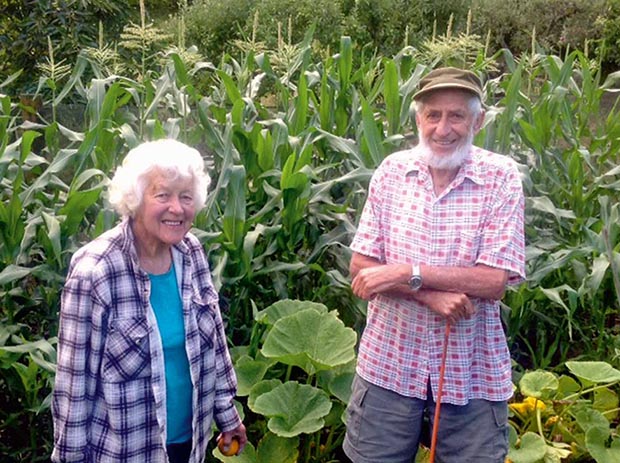
Who: Bill (83) and Jean (80) Kirkham
Live: Tauranga,
Land: 4ha (10 acres)
Bill ‘Grandpa’ Kirkham might have finished farming professionally, but he’s not ready to leave the land and you certainly couldn’t say he and Jean are retired either.
“They’re certainly kicking back,” says their son Mark. “But mum sea kayaks, she has a massive garden, she’s pretty motivated.
“Dad is happy to sit back and cruise, he prefers to be on the farm – he doesn’t want to live in town – so he keeps a few cattle, rears a few calves, he grazes my property too because I’m always away.
“They’re both in pretty good health and still sharp. Mum is a vegetarian and has a massive vegetable and flower garden but she’s trying to downsize, it’s getting harder to maintain every year. When we get back (from the shows) I’ve got quite a bit of work to do for her, removing trees and helping with changes to their gardens.”
TAKING GRANDPA’S FEEDER TO THE WORLD?
When the company made its first foray into the UK to do a show, they worked very hard but only sold a small number.
“We had a website made, we spent a truckload of money on print advertising and we failed,” says Mark. “Probably we had the wrong agents, they were real city folk in the middle of London and we realised after a year it wasn’t going to work.”
Their second attempt was with a small company based in a rural spot near the Welsh border, run by “traditional Englishman” Richard Allum. Mark, Alla and business partner Graham flew to the UK to attend a show and train Richard on how to sell the feeders.
“We took him banners, did a three-day show, showed him the ropes, showed him how we did it. We had a cracker show, the Welsh loved it – they have very similar problems, not so much sparrows, in places like that it’s pigeons and rooks, crows and rodents.
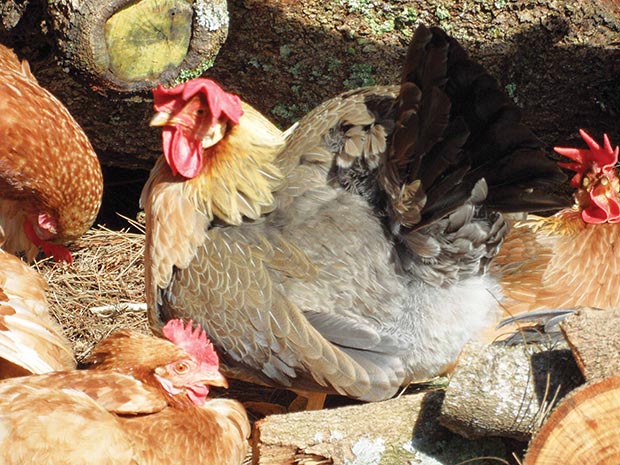
“Richard works really hard for us, he got things going and we had some lucky breaks. A guy from a BBC gardening show with nine million viewers had bought one – unbeknown to us – and talked about it on his TV show. We sold 90 feeders in the next 10 days, when before we were struggling to sell a dozen a week.”
When they decided to try selling in the USA, it was another local Bay of Plenty business that turned out to be their best contact.
“Our American operation is run by a Tauranga firm Trimax Mowers (American branch). Base3USA (owner) Moira was incredibly helpful when we were trying to get things off the ground and it would have been very hard without her. They manage a dozen other NZ products out of their warehouse in Georgia so we are quite fortunate to have a local company helping us.”
3 LESSONS FROM MARK AND ALLA
1. RETAIL STORES ARE STILL IMPORTANT
One of the successful investments in recent years for the Kirkhams has been the company’s website, www.grandpasfeeders.co.nz and its Australian, UK and US versions, but supplying their product to retailers has been their latest focus.
“We originally thought everything was going to be done over the internet and we didn’t need shops, but that hasn’t been the case. We realise now you need to be in shops because there’s a certain percentage of people who only shop that way.
“We’ve been in discussion with rural supply outlets and we didn’t think we would ever be doing that, but you can’t do it solely over the internet, there are too many people who don’t shop on computers.”
2. ENGAGE THE EXPERTS
The company’s website was designed by a professional website development team, and the Kirkhams now also contract an agency to manage the marketing workload.
“We’re always looking for ways to improve, and now with so much competition we’re looking for an edge,” says Mark. “We’ve got our product in four countries so we can certainly justify employing experts in some areas.
“I do go on about it a bit, but it’s all about marketing. I’ve seen some really neat products that have failed because their marketing hasn’t been up to scratch and for every one of those I’ve seen some junk that’s sold really well because of good marketing.
“Marketing is the most important: get that right, and if you’ve got a good product, you’re nine-tenths of the way there.”
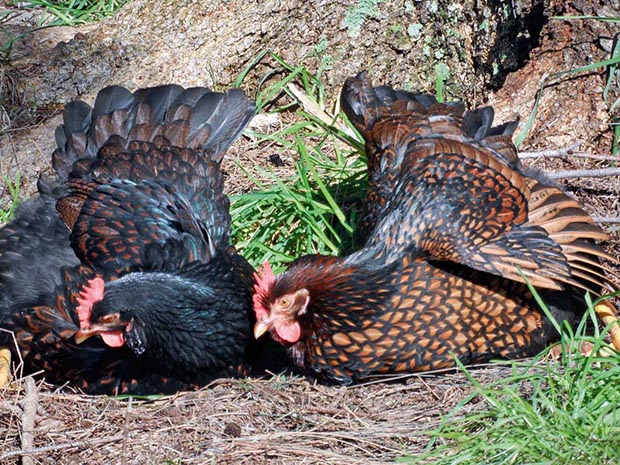
3. YOU’RE NOT JUST SELLING A PRODUCT FOR CHICKENS – IT’S FOR PEOPLE
Selling their feeders has taught the Kirkhams that people don’t buy it just because it saves them on the cost of pellets or mash.
“It’s not just about that, it’s about (the customer) – we’re giving them a better way to enjoy keeping chooks, they’re not tied to daily feeding, they’re not attracting rats and mice and sparrows, they’re not having to worry about their chooks when they go away, it ticks a lot of boxes for a lot of people.”
Love this story? Subscribe now!
 This article first appeared in NZ Lifestyle Block Magazine.
This article first appeared in NZ Lifestyle Block Magazine.

